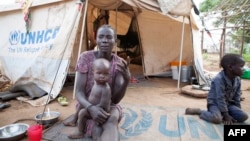Young South Sudanese refugees in camps in Ethiopia speak their minds about the South Sudan government, the rebels and their failure to end 10 months of fighting.
South Sudan President Salva Kiir met his former vice-president Riek Machar last week in Arusha, Tanzania in another attempt to reach a peace deal.
The fighting has displaced nearly 2 million people. And over 200,000 have fled to neighboring countries such as Ethiopia.
Gatwech Sok fled the fighting in Upper Nile State and came to Ethiopia in July. The 22-year-old student believes the fighting will stop soon. He says peace can be reached if the people of South Sudan unite and stand together.
Another head of state meeting is planned in the coming days in Addis Ababa, where peace talks have been taking place for months. One major issue is establishing a transitional government of national unity. Several agreements were signed earlier this year, including a much violated cease-fire deal.
Reath Bum is 25 years old and was a soldier in the opposition forces. He came to Ethiopia in July to bring his family in to safety. He wants to go back again to fight, but doesn’t have the funds for transport back to South Sudan. He believes fighting is the better option now.
He says they are fighting for their rights and only if the president steps up, can the war stop.
Most refugee camps in the northern part of Gambella province are hosting South Sudanese who came from Upper Nile State and all are ethnic Nuers.
Everyone in these camps believes no lasting peace agreement can be reached if the ethnically Dinka president Kiir remains in office. The Dinka are the largest ethnic group in South Sudan.
Kiir’s opponent, former vice-president Machar belongs to the second largest ethnic group, the Nuer, and so do many of Machar’s soldiers. The contested coup, that Kiir accuses his former deputy of, quickly turned violent and ethnic.
Wang Diew, 27, a Nuer himself, says people were being killed just for belonging to a certain ethnic group. He says the main reason why fighting broke out in South Sudan is tribalism.
Rebecca Nyakuel is a 30-year-old mother of three. The fighting made her decide to cross the border into Ethiopia last July to keep her children safe from the war. She used to cultivate her own crops in Upper Nile State but now depends on food distributions. She believes the country needs a new president.
She says that if there is a good president, the war can stop. But the war will not end with Salva Kiir as president.
Current discussions between the two warring factions are focusing on sharing power between Kiir and former vice president Machar. The East African bloc IGAD has led the peace talks and has the delegations discussing the framework for a transitional government of unity.
The two sides admitted last week that both factions are responsible for the violence in South Sudan and again pledged to work towards peace and stability as the conflict has killed over ten thousand people so far.




